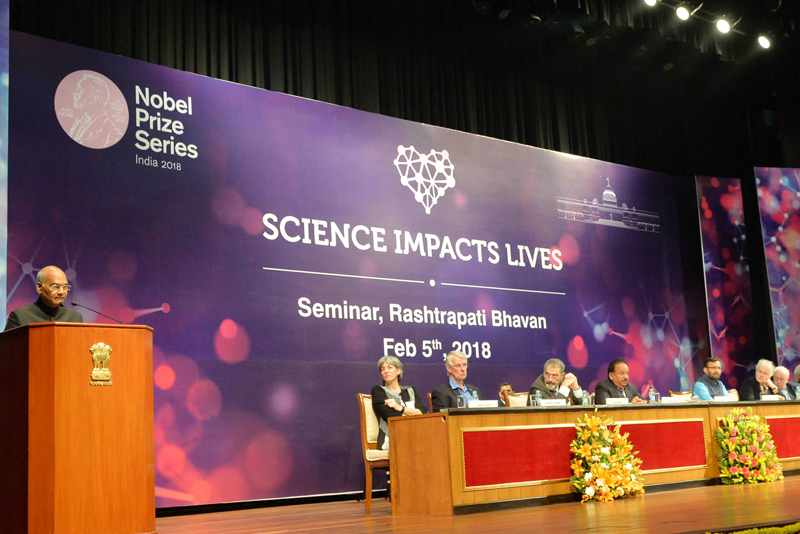ADDRESS BY THE PRESIDENT OF INDIA, SHRI RAM NATH KOVIND ON THE OCCASION OF INAUGURATION OF THE NOBEL LAUREATES SEMINAR
Auditorium, Rashtrapati Bhavan Cultural Centre : 05.02.2018

1. I welcome you all to Rashtrapati Bhavan. I am glad to be here – and I am glad we all are here - for the Nobel Laureates Seminar. This is part of the Nobel Prize Series, a regular and landmark engagement between the Indian scientific and policy community and the Nobel Foundation.
2. The spirit of inquiry and the curiosity of discovery are at the root of science. These have a long tradition in India. As has been said in a lighter vein, India revolutionised science and mathematics by giving the world nothing – literally nothing. I refer of course to the concept of zero – which originated in India. From mathematics to astronomy, from the study of metals to the study of medicine, India has an age-old history of nurturing science and scientific thinking.
3. At the birth of the modern age, the centres of science and technology were in the West, in Europe and the United States. Like in international politics and economics, the power structure of science was also influenced by colonial equations. In the early 20th century, Indian scientists began to challenge this. With limited resources and using their own initiative, they did brilliant work right here in India.
4. There are so many examples that can be offered. J.C. Bose was an innovator and scientist of world-class distinction. He demonstrated wireless transmission of microwaves as far back as 1895. This was much ahead of the Italian engineer Marconi and his transmission of radio waves. He also founded the Bose Institute in Kolkata, a pioneering institution in our country that recently completed its centenary. In fact a few months ago, I was happy to be at the closing ceremony of its centenary celebrations. There were others too. C.V. Raman was the first Indian to win the Nobel Prize for physics, in 1930. And if the Fields Medal had been instituted when he was alive, the extraordinary Srinivasa Ramanujan would certainly have been a strong contender.
5. In the 70 years since India became independent, belief in science has shaped our society and developmental process. From agriculture to harnessing the energy of the atom, from vaccine innovation to advances in space technology, science has helped us build our nation – brick by brick. Or should I say moleculeby molecule!
6. Keeping pace with this investment in science, we have also invested in people through our institutions of higher education. We have recently created several central universities; Indian Institutes of Technology; All India Institutes of Medical Sciences; and Indian Institutes of Science Education and Research. These investments will create a huge pool of scientists, clinician researchers and technologists for a changing India.
7. For these investments to bear fruit, these institutions and also our schools must be as good as the best in the world. This is a challenge but together we can accomplish it. Together we can make innovation not just a passion for our scientific elite, but the lifeline of our schooling system.
8. Three things are needed for success. First, our scientists, from PhD students to senior technologists, must have a shared sense of purpose. They must address quality capacity building, participate in national missions, and take on frontier research. Fragmented, individual-driven approaches must move to building teams of the highest quality.
9. Second, our research institutes and universities must cooperate with intelligence and harmony to form research hubs. These hubs can set new standards of excellence not only for India but also for the world. The tech hub in Bengaluru is a case in point. We need many more.
10. And third, because the world is constantly changing and ideas flow from every side, our scientists must be connected to the latest advances in research and technology. Science is nothing if not a global enterprise. It is this last point which is our focus today. How do we build world class institutions and universities and how do these connect to our society – both within our national boundaries and beyond?
11. The Nobel Laureates and the Fields Medal winners assembled here will interact with the cream of India’s scientists and researchers, students and university leaders, to see how we can make our institutions among the best. And how these can transform our society.
12. As visitor to many of our universities and institutions of higher learning, I have a personal interest in the deliberations today. I wish all you an intellectually rich and valuable set of discussions over the course of the day. And this afternoon I look forward to actionable recommendations that India can use – and our world can use - and benefit from.